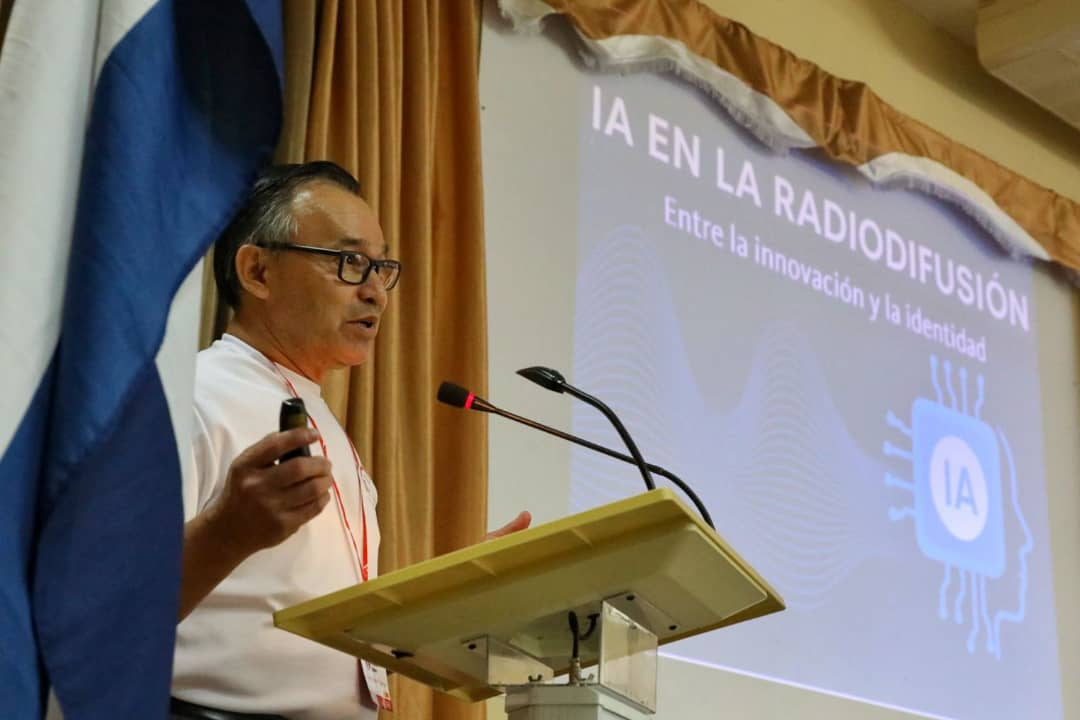
Camagüey, June 5th. - The opportunities, dangers, and ethical, labor, and cultural challenges posed by the use of artificial intelligence in radio production marked the beginning of the 36th National Festival of Cuban Radio, held in this city until June 8.
Radio, a deeply rooted means of communication in Cuba, with a tradition spanning more than a century, is today facing one of the greatest turning points in its history: the emergence of technologies that not only transform the way content is produced, but also challenge such essential notions as identity, authenticity, and human connection.
An initial session dedicated to theoretical exchange, held at the Santa Cecilia Convention Center, opened the debate from international and national perspectives, showcasing both the challenges and the possibilities offered by this disruptive technology.
Engineer Calixto Rodríguez, from El Salvador, addressed the modeling of an artificial voice or text to warn about the risks this poses to identity and territorial connection, aspects that have been pillars of community radio in Latin America.
"This artificial intelligence poses new challenges for us. It's no longer just about writing, but about getting it to write exactly what we want; for it to be an assistant with whom we constantly communicate and that expresses our identity," he insisted.

On the Cuban side, a panel moderated by Odalys Oriol integrated the academic knowledge of Dr. Hernán Yglesias, of Radio Ariguanabo, with the practical experience led by Jairo Pacheco of Radio Sancti Spíritus.
Hernán emphasized that understanding this technological transformation requires a profound shift in mindset among traditional radio creators. He also noted that "learning to learn" becomes essential in an environment that demands new technical skills, new professional profiles, and updated legal frameworks.
"Are we ready to build a new radio?" he asked, after warning about dehumanization, the erosion of trust in humanity, and the standardization imposed by the cultural industries. "We are a medium that creates emotion and stories," he recalled, appealing to the irreplaceable value of human sensitivity in radio storytelling.
From a practical perspective, Jairo shared how free artificial intelligence tools have allowed Radio Sancti Spíritus to transform into a multiplatform. The flow of content from the radio station to YouTube, the web, and social media is now coordinated through the avatar Rosalba, who acts as a virtual presenter.
"The real challenge for radio is to develop its own artificial intelligence that guarantees technological sovereignty," he noted. He cited initiatives such as story animation for digital platforms, the use of automated audiovisual editors, and the design of virtual presenters as examples.
He called for strengthening alliances with the country's technological faculties so that academia can find radio as a laboratory for creation and development, and he emphasized the need for personal development to master these tools.
“Designing content for all platforms is a headache,” he acknowledged. He added, “AI isn't made for those of us on the left,” referring to the ideological and ethical challenges that come with using technologies developed by hegemonic centers of power.
The morning and afternoon sessions addressed other topics, interwoven with a sense of history, culture, and the professional knowledge accumulated over more than one hundred years of Cuban radio tradition. In a turbulent world, where traditional media are facing a global transformation, radio's role as a space for memory, education, and affection remains vital.

At the opening ceremony, Yuzaima Cardona Villena, General Director of Cuban Radio, thanked artists, journalists, filmmakers, National Prize winners, and foreign guests from El Salvador, Colombia, and Argentina, who had prioritized their presence in Camagüey.
This edition brings together approximately 200 participants, representing the country's 100 broadcasters and Latin American community experiences. According to Cardona Villena, the festival's goal is to immediately apply what has been learned to continue winning over audiences, while the Cuban process of building a national policy on artificial intelligence advances. (Yanetsy León González/Adelante Digital) (Photos: Leandro Pérez Pérez/Adelante Digital)